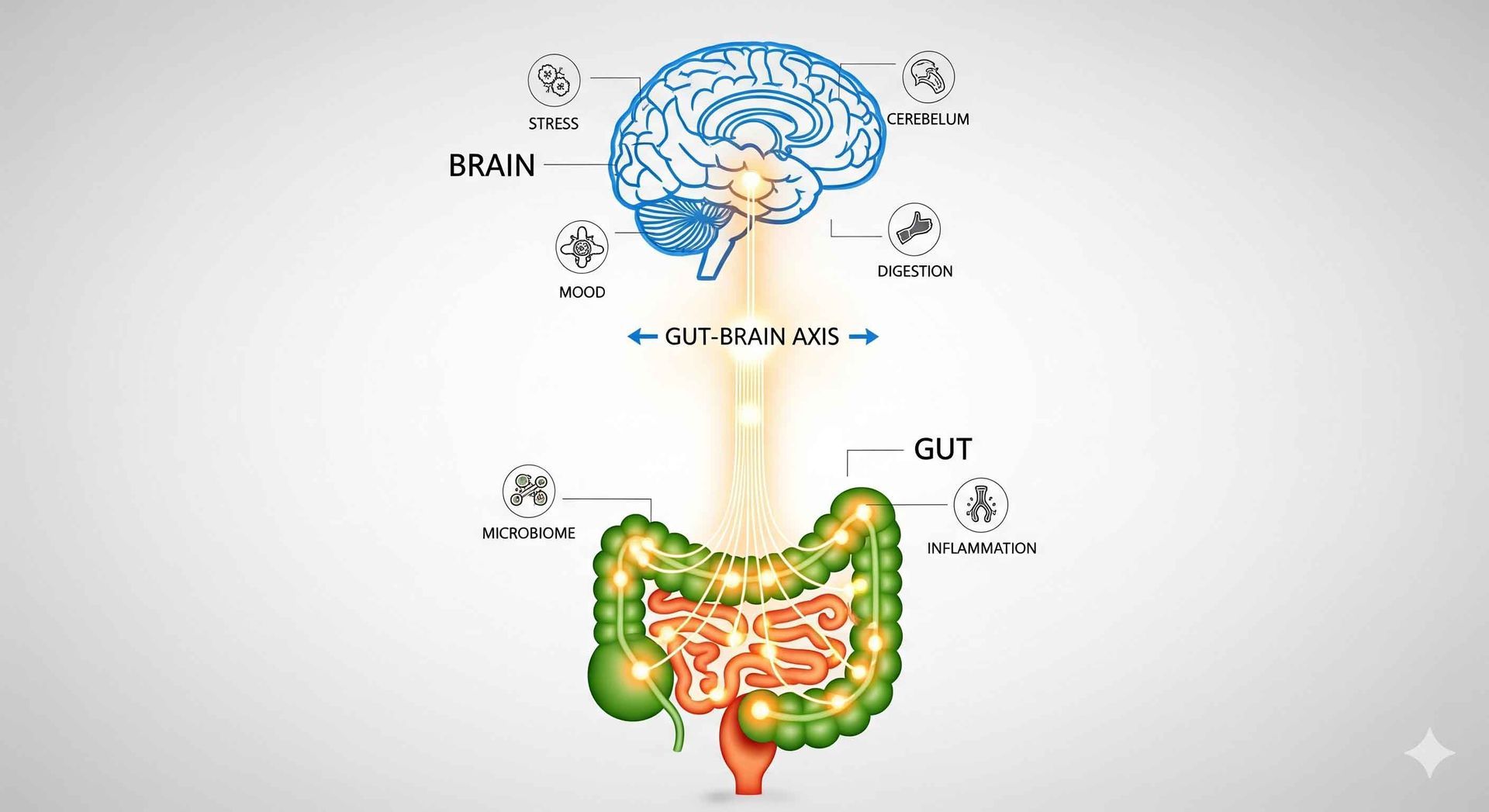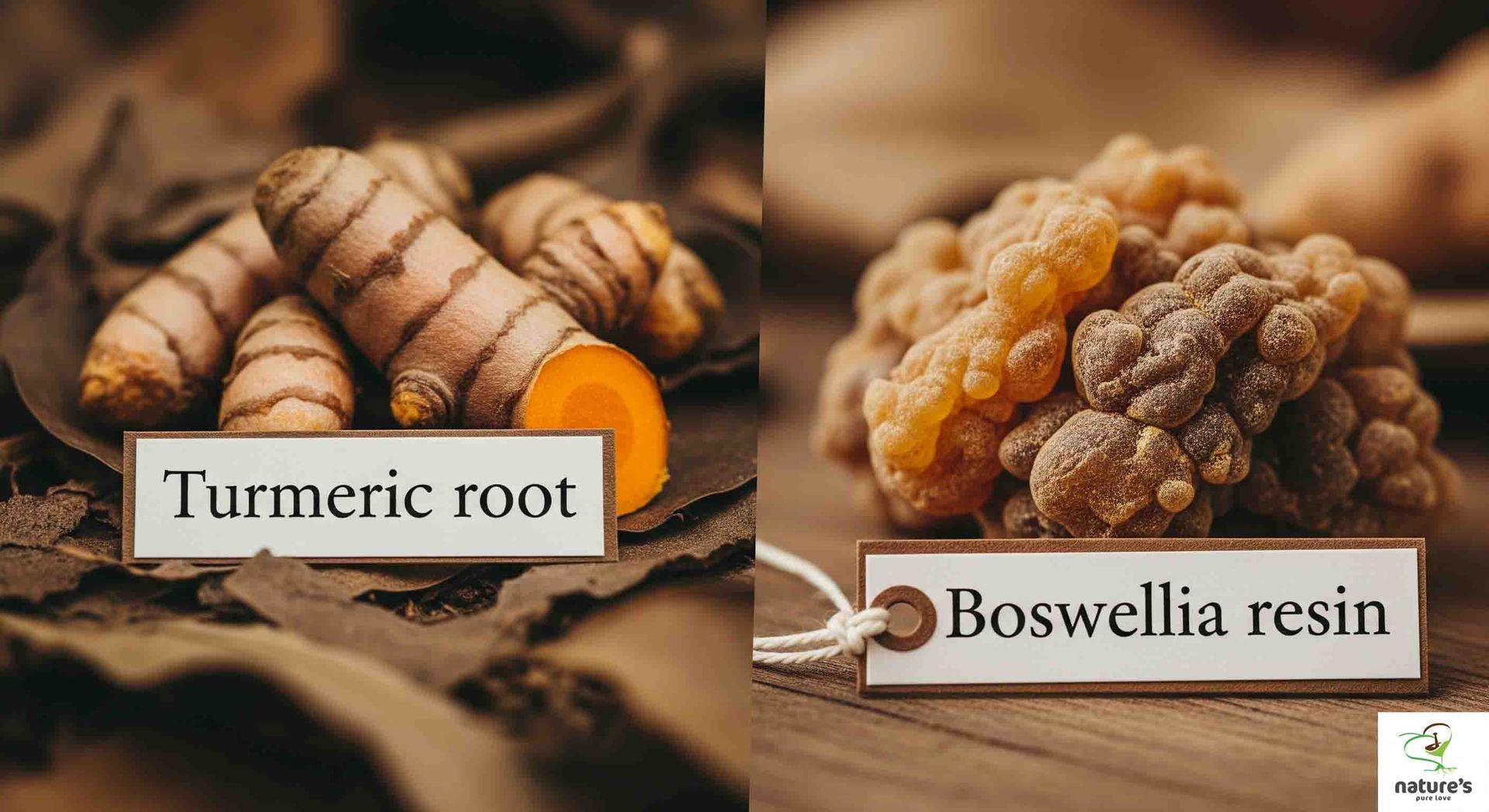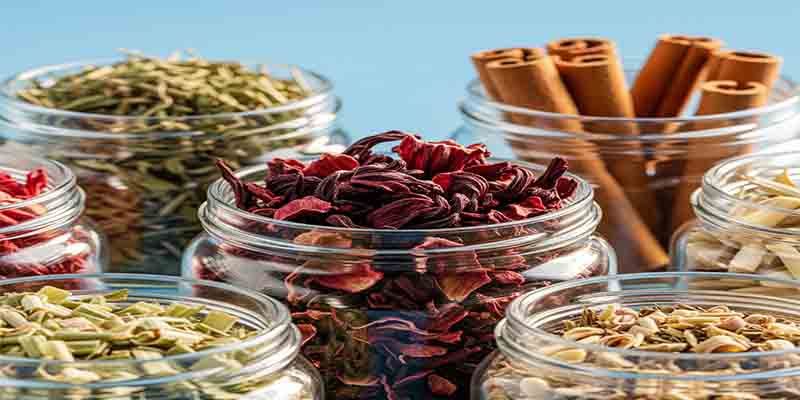Summer Wellness Reset: Gut Health, Nutrition, and CBD for Pain Relief
1. Gut Health: The Core of Summer Wellness

1.1 The Gut Microbiome and Why It Matters
Inside the human body lives an entire ecosystem of microorganisms—often described as an “inner garden.” This gut microbiome contains an estimated 100 trillion microbes, outnumbering human cells and weighing up to 2 kilograms. These microbes include bacteria, fungi, viruses, and archaea, most of which live in the large intestine.
The microbiome’s importance goes far beyond digestion. Scientists now know it influences:
- Digestion and nutrient absorption: Certain bacteria break down complex carbohydrates, plant fibres, and resistant starches that the stomach and small intestine cannot digest on their own. In doing so, they release nutrients like short-chain fatty acids (SCFAs), which nourish colon cells, support energy metabolism, and help regulate inflammation.
- Vitamin synthesis: Gut bacteria produce essential vitamins such as Vitamin K and many B vitamins, including folate and biotin, which are crucial for energy and brain function.
- Immune health: Roughly
70% of the immune system resides in the gut. A balanced microbiome trains the immune system to distinguish between friendly and harmful invaders, reducing the risk of overreactions or chronic inflammation.
- Metabolism and weight balance: Studies suggest that gut microbes influence how many calories we extract from food and may play a role in conditions like obesity or type 2 diabetes.
Summer-specific challenges:
- Eating more takeaways or barbecued foods may increase fat and sugar intake, which can reduce microbiome diversity.
- Alcohol consumption, particularly beer and cocktails, can harm beneficial bacteria.
- Travel often means exposure to unfamiliar bacteria, which may temporarily disrupt gut balance.
Supporting your microbiome in summer means choosing fresh, fibre-rich foods, staying hydrated, and being mindful of alcohol and processed foods. NHS

1.2 The Gut-Brain Connection
Your digestive system has been called the “second brain”, and for good reason. The gut and brain are connected via the gut-brain axis, a communication network involving nerves, hormones, and immune signals.
- The
vagus nerve acts like a highway, carrying messages between your gut and central nervous system.
- Gut microbes produce neurotransmitters such as serotonin, dopamine, and GABA, which influence mood, stress response, and even sleep quality.
- When the microbiome is imbalanced, the signals sent to the brain can shift, contributing to anxiety, low mood, or poor sleep.
Impact of stress on digestion:
- Stress triggers cortisol, which slows digestion and can increase bloating or constipation.
- Chronic stress reduces beneficial microbes and encourages the growth of harmful ones.
- Anxiety often worsens digestive symptoms, creating a cycle of stress and discomfort.
Practical steps for balance:
- Mindful eating: Taking time to chew slowly helps regulate digestion and signals satiety.
- Relaxation techniques: Meditation, yoga, or breathwork reduce cortisol levels and support gut balance.
- Sleep hygiene: Deep, restorative sleep encourages microbial diversity, which in turn improves mood and energy.
Uttah State University
1.3 Signs of an Unhealthy Gut
Gut problems are not always obvious. While bloating, gas, diarrhoea, or constipation are classic signs, other less direct indicators often go unnoticed.
- Low energy and fatigue: Poor nutrient absorption due to imbalanced microbes can leave you feeling drained even with enough sleep.
- Unexplained weight gain or loss: Disruptions in microbial balance affect how calories are extracted and stored.
- Skin conditions: Research links gut imbalances to eczema, acne, and psoriasis, possibly due to increased systemic inflammation.
- Weakened immunity: Frequent colds or slow recovery from illness may reflect a struggling gut.
- Mood disturbances: Imbalances in gut bacteria can alter neurotransmitter production, affecting mood stability.
Summer risk factors for gut imbalance:
- More alcohol consumption during holidays.
- Greater likelihood of food poisoning from improperly cooked or stored food.
- Stress from travel, disrupted sleep, and irregular routines. Gov.uk
Takeaway: Your gut health influences far more than digestion—it affects immunity, skin, weight, and even mood. Paying attention to subtle signs of imbalance can help you take preventive steps before issues escalate.
2. Summer Digestive Reset: Nutrition and Lifestyle
2.1 Foods and Drinks That Support Gut Health in Summer
Summer brings an abundance of fresh, seasonal produce in the UK, which makes it the perfect time to nourish your gut. The focus should be on foods that are rich in fibre, probiotics, prebiotics, and hydration.
Fibre for balance:
- The NHS recommends
30g of fibre per day, yet most adults in the UK only consume around 18g.
- Fibre feeds beneficial gut bacteria, supporting digestion and producing short-chain fatty acids (SCFAs) that reduce inflammation.
- Good sources include oats, barley, whole wheat bread, lentils, chickpeas, apples, pears, carrots, and leafy greens.
- Summer favourites such as
raspberries, strawberries, and peas are excellent, easy-to-add fibre options.
Probiotics to restore gut flora:
- Found in live yogurt, kefir, sauerkraut, miso, kimchi, and kombucha.
- They introduce beneficial bacteria that help balance the gut, especially after antibiotics, food poisoning, or travel.
- NHS advice suggests trying probiotics daily for at least
4 weeks to see benefits.
Prebiotics to fuel probiotics:
- Prebiotics are non-digestible fibres that “feed” probiotic bacteria.
- Sources include onions, garlic, bananas, asparagus, and chicory root.
- Combining probiotics (like yogurt) with prebiotics (like a banana) creates a powerful “synbiotic” effect.
Hydration:
- Warm weather increases sweat loss, making hydration vital for digestive health.
- Aim for
6–8 glasses of fluid daily—preferably water.
- Alternatives: unsweetened herbal teas, sparkling water with lemon, or coconut water for natural electrolytes.
- Avoid over-relying on fizzy drinks and alcohol, which may irritate the gut and dehydrate the body.
Meal choices:
- Lighter meals, eaten more frequently, are easier to digest in hot weather.
- Choose grilling, steaming, or baking instead of frying to reduce fat intake.
- Pair proteins (like fish or chicken) with wholegrain sides and colourful seasonal salads.
- Reduce intake of heavily processed, fried, or spicy foods, which can worsen bloating or reflux.
Sample Summer Gut-Friendly Meal Plan (UK-based):
- Breakfast: Overnight oats with chia seeds, berries, and kefir.
- Lunch: Grilled salmon with quinoa and roasted vegetables.
- Snack: A banana with live yogurt.
- Dinner: Grilled chicken skewers with wholegrain couscous and leafy greens.
- Drink: Mint-infused water or chilled chamomile tea.
NHS
2.2 How Do Stress and Sleep Impact Digestion?
Digestion isn’t just about food—it’s heavily influenced by lifestyle. The gut-brain connection means that stress and sleep play critical roles in how well your digestive system functions.
Stress:
- High stress increases cortisol, which slows digestion and diverts blood flow away from the gut.
- Stress can cause bloating, cramping, diarrhoea, or constipation.
- Chronic stress reduces the diversity of gut bacteria, making the microbiome more vulnerable.
Sleep:
- Poor sleep alters the balance of gut bacteria and may worsen acid reflux or indigestion.
- Lack of sleep increases cravings for sugary, fatty foods, which can further disrupt digestion.
Practical Summer Strategies:
- Exercise: Gentle activities such as swimming, walking, or cycling help regulate digestion and reduce stress.
- Mindfulness: Meditation, journaling, or breathwork calms the nervous system.
- Sleep hygiene: Aim for 7–9 hours per night. Limit screen use an hour before bed, and keep your bedroom cool and dark.
Are detox diets safe or a myth?
- Many “detox” or “cleanse” programmes promise to flush out toxins, but there is little scientific evidence to support them.
- The liver and kidneys are your body’s natural detox organs—they work continuously, even while you sleep.
- Juice cleanses may reduce calorie intake but often cause fatigue, headaches, and nutrient deficiencies.
- Colon cleanses and extreme fasting can be dangerous, leading to dehydration and electrolyte imbalances.
Better alternative: Adopt a gentle reset that focuses on whole, unprocessed foods, daily fibre, and proper hydration. This approach supports your body’s natural detox systems without unnecessary risks.
2.3 How Can You Prevent Digestive Issues in Summer?
Food safety during barbecues and picnics:
- Summer increases the risk of
foodborne illnesses like salmonella and E. coli, with NHS data showing higher cases during warmer months.
- Always keep raw and cooked foods separate.
- Store perishable foods in cool bags with ice packs if dining outdoors.
- Cook meats to safe internal temperatures (use a thermometer, not guesswork):
- Poultry:
74°C (165°F)
- Ground meats:
71°C (160°F)
- Fish:
63°C (145°F)
- Beef/lamb cuts:
63°C (145°F) + rest for 3 minutes.
Travelling and digestive health:
- Traveller’s diarrhoea affects up to 50% of international travellers, especially in regions with poor sanitation.
- Preventative tips:
- Drink bottled or boiled water; avoid tap water in higher-risk regions.
- Skip ice cubes unless you’re certain they are made from safe water.
- Eat only freshly cooked food served hot. Avoid raw seafood, undercooked meat, or unwashed salads.
- Wash hands frequently and carry alcohol-based sanitiser.
If you get traveller’s diarrhoea:
- Stay hydrated with water and oral rehydration salts.
- Eat bland foods such as rice, bananas, and toast until symptoms ease.
- Seek medical attention if you develop high fever, severe abdominal pain, or blood in stool. wwmedgroup
3. CBD for Joint Pain Relief
3.1 How Does CBD Work for Pain and Inflammation?
What is CBD?
CBD (Cannabidiol) is one of over 100 naturally occurring compounds called
cannabinoids, found in the Cannabis sativa plant. Unlike THC (tetrahydrocannabinol), CBD is
non-psychoactive, meaning it does not cause a “high.”
The Endocannabinoid System (ECS):
The human body has an internal regulatory network known as the ECS, which helps maintain balance in processes like sleep, mood, appetite, and pain perception. It is made up of:
- Endocannabinoids – natural compounds produced by the body.
- Receptors (CB1 and CB2) – found throughout the body, especially in the brain, immune system, and joints.
- Enzymes – which break down cannabinoids once they are no longer needed.
CBD doesn’t bind directly to these receptors in the same way THC does. Instead, it appears to modulate receptor activity, influencing pain signals, inflammation, and immune responses.
Scientific insights:
- Animal studies have shown CBD can reduce inflammation in arthritis-like conditions.
- Small-scale human trials suggest CBD may ease joint stiffness and discomfort, but more robust research is required before it can be officially recommended as treatment.
- CBD may also influence serotonin and vanilloid receptors, both of which play a role in mood regulation and pain perception.
What this means practically:
CBD may offer
support for joint comfort and mobility, but it is not a cure, nor should it replace prescribed treatments. In the UK, it is classified as a wellness product, not a medicine, unless licensed by the MHRA (Medicines and Healthcare products Regulatory Agency).
3.2 What Should You Check Before Buying CBD in the UK?
With CBD products flooding the market, quality and safety vary widely. Choosing carefully is essential.
1. Product Types:
- CBD oils/tinctures: Taken under the tongue for faster absorption.
- Capsules and softgels: Convenient, with precise dosages.
- Topicals (creams, balms, gels): Applied directly to the skin, popular for localised joint and muscle support.
- Edibles (gummies, chocolates, drinks): Easy to use but slower to act as they pass through digestion.
- Vape liquids: Provide quick effects but may not be suitable for everyone due to respiratory concerns.
2. CBD Spectrum:
- Full-spectrum CBD: Contains CBD plus other cannabinoids and terpenes, with trace THC (must remain under 1mg per container in the UK).
- Broad-spectrum CBD: Contains multiple cannabinoids and terpenes but with THC removed.
- CBD isolate: Pure CBD, no other plant compounds.
Some users prefer full- or broad-spectrum CBD for the “entourage effect” — the theory that plant compounds work better together.
3. Quality Checks:
- Ensure the product is registered with the
UK Food Standards Agency (FSA) under the
Novel Foods Regulation.
- Look for
third-party lab reports (Certificates of Analysis) showing exact CBD content, THC levels, and absence of contaminants like heavy metals or pesticides.
- Choose brands that clearly state the amount of CBD per dose. Avoid vague terms like “hemp oil” without specifying CBD content.
4. Dosage Guidance:
- The
FSA advises a maximum of 10mg CBD per day for healthy adults. This is far lower than older guidelines, reflecting a cautious approach to safety.
- Start low and monitor how your body responds before considering an increase.
- Remember that effects vary based on the delivery method (oral vs. topical).
3.3 What Are the Legal Rules for CBD in the UK?
CBD is legal in the UK, but only under strict conditions:
- No medical claims: Products cannot be marketed as treating or curing specific health conditions (such as arthritis or anxiety) unless licensed by the MHRA.
- THC limits: Each product container must contain
less than 1mg of THC in total, regardless of concentration.
- FSA approval: CBD products for oral consumption must undergo safety assessment and be listed on the FSA’s official public register.
Important distinctions:
- Hemp seed oil (used for cooking or skincare) does not contain CBD, even though it comes from the cannabis plant.
- CBD vapes are regulated separately from edibles or oils, falling under vaping product regulations. food.gov.uk
3.4 Possible Side Effects of CBD
While CBD is generally well tolerated, side effects can occur, especially at higher doses:
- Dry mouth
- Drowsiness or fatigue
- Changes in appetite or weight
- Gastrointestinal upset (nausea, diarrhoea)
CBD can also interact with medications, particularly those processed by the liver (such as blood thinners or epilepsy drugs). This makes medical guidance essential before starting CBD.
3.5 Consumer Checklist: Safe CBD Shopping in the UK
- Look for products listed on the FSA Novel Foods register.
- Check for third-party lab reports (Certificates of Analysis).
- Choose clear labelling with CBD content per dose.
- Avoid products making bold medical claims.
- Stick to the FSA’s recommended daily limit (10mg).
- Consult a healthcare professional if you are on medication or have health conditions.
3.6 CBD Trends in the UK Wellness Market
nCBD has become one of the fastest-growing wellness supplements in the UK:
- A 2022 report by the Centre for Medicinal Cannabis estimated the UK CBD market to be worth over
£690 million annually — larger than the UK vitamin C and vitamin D markets combined.
- Popular demographics include
professionals, athletes, and older adults seeking joint support, stress relief, and improved sleep.
- Consumer demand has shifted towards
topicals and edibles, as they feel more approachable than oils or vapes.
This growing interest reflects a broader move towards natural, holistic solutions for self-care — but it also means consumers need to be more cautious than ever about product quality and compliance.
4. Safety and Medical Guidance on CBD
4.1 Why Safety Matters
CBD is widely perceived as “natural” and therefore risk-free. While it is indeed plant-derived and generally well tolerated, “natural” does not always mean harmless. Like any supplement, CBD may cause side effects, interact with medications, or be unsuitable for certain groups.
Potential side effects include:
- Dry mouth – due to reduced saliva production.
- Drowsiness or fatigue – especially at higher doses.
- Digestive issues – including nausea, diarrhoea, or appetite changes.
- Dizziness or light-headedness – in sensitive individuals.
4.2 Medication Interactions
CBD can interfere with the way the liver metabolises certain drugs. Specifically, it affects cytochrome P450 enzymes, which are responsible for breaking down many common medications, including:
- Blood thinners (e.g., warfarin).
- Anti-epileptic drugs.
- Some antidepressants and antipsychotics.
- Statins (cholesterol-lowering medications).
This means CBD can increase or decrease drug levels in the bloodstream, potentially leading to adverse effects.
Takeaway: If you are taking prescription medication, always consult a doctor or pharmacist before considering CBD.
4.3 Who Should Avoid CBD?
The FSA and NHS advise that CBD should not be used by:
- Under-18s (safety has not been studied in children).
- Pregnant or breastfeeding women (lack of safety evidence).
- People with liver problems (CBD may increase liver enzymes).
Those on medication unless cleared by a healthcare professional.
4.4 Why Medical Advice Is Essential
While early research is promising, CBD should not be viewed as a cure or a replacement for medical care. Joint discomfort, fatigue, or digestive problems may be symptoms of underlying health conditions requiring professional attention. Always seek guidance before introducing CBD or any new supplement into your routine.
5. A Holistic Approach to Summer Wellness
CBD is only one part of the wellness puzzle. True summer transformation requires an integrated approach that combines nutrition, lifestyle, movement, rest, and stress management.
5.1 Nutrition for Seasonal Vitality
- Eat seasonally: UK summer produce such as strawberries, cucumbers, courgettes, and tomatoes are rich in antioxidants and fibre.
- Balance indulgence: Enjoy barbecues and picnics, but pair heavier foods with lighter, gut-friendly options (salads, fruit, grilled vegetables).
- Smart snacking: Swap crisps and sweets for nuts, seeds, and fresh fruit.
5.2 Movement and Joint Health
Summer’s longer days are ideal for increasing physical activity:
- Low-impact exercises: Swimming, cycling, and brisk walking reduce stress on joints while boosting cardiovascular health.
- Strength training: Light weights or resistance bands help maintain bone density and muscle strength, which supports joints.
- Flexibility practices: Yoga or stretching routines maintain mobility, reduce stiffness, and support posture.
Tip: Warm up before activities and stay hydrated to protect joint tissues.
5.3 Stress and Emotional Balance
The gut-brain connection reminds us that emotional wellbeing is key to digestive and overall health.
- Mindfulness: Spend 5–10 minutes daily focusing on your breath to reduce stress.
- Nature time: Exposure to green spaces lowers cortisol and supports mental clarity.
- Digital detox: Take breaks from constant screen use, especially before bed.
5.4 Sleep as a Wellness Foundation
Quality sleep allows the body to repair tissues, regulate hormones, and strengthen the immune system.
- Aim for 7–9 hours per night.
- Keep a consistent bedtime and wake-up time, even on weekends.
- Create a bedtime routine: dim lighting, herbal teas (like chamomile), and no screens at least 30 minutes before sleep.
5.5 Hydration Beyond Water
- Electrolytes: In hot weather, you lose salt and potassium through sweat. Replenish with bananas, leafy greens, or coconut water.
- Herbal teas: Peppermint aids digestion, chamomile supports relaxation, and ginger tea may ease bloating.
- Limit alcohol: Alcohol dehydrates and disrupts sleep; alternate each drink with a glass of water.
6. Summer Wellness Checklist
✅ Gut Health: Include 30g fibre daily, add probiotics and prebiotics, and stay hydrated.
✅
Nutrition: Eat seasonal UK produce, balance indulgence with lighter meals.
✅
Movement: Aim for 30 minutes of activity daily — mix cardio, strength, and stretching.
✅
Stress Management: Practise mindfulness, meditation, or yoga at least 10 minutes a day.
✅
Sleep: Maintain 7–9 hours nightly with good sleep hygiene.
✅
CBD Safety: If considering CBD, keep to the FSA’s 10mg daily limit and consult a healthcare professional.
✅
Travel & Food Safety: Follow safe cooking practices, avoid risky foods abroad, and carry hydration solutions.
Final Note
Summer is a season of light, energy, and growth — but also one that can challenge digestion, disrupt routines, and strain the body if we’re not mindful. By paying attention to gut health, fuelling yourself with balanced nutrition, moving your body, protecting your joints, and managing stress and sleep, you can feel energised and resilient throughout the season.
CBD may offer additional support for joint comfort, but it is just one tool among many in a holistic approach to wellbeing. Always prioritise safety, quality, and professional guidance when exploring new supplements.
Above all, remember: Your Health Is in Your Hands. Small daily choices made this summer can create long-lasting vitality for the seasons ahead.
Are you sick and tired of being sick and tired? This summer, transform stress, fatigue, and poor routines into clarity, energy, and flow. With NPL’s
C.R.E.A.M. Holistic Health Plan, you’ll learn how to cleanse, regenerate, and maximise your wellbeing with practical daily habits that fit into even the busiest lifestyle.
Book your free 7-Day Alignment Challenge today and take the first step towards living with balance and purpose.
Frequently Asked Questions: Summer Wellness
The gut microbiome is an ecosystem of trillions of microorganisms, including bacteria, fungi, and viruses, that live inside your large intestine. It plays a crucial role in more than just digestion—it also influences your immune system, metabolism, and even mood. An imbalanced microbiome can contribute to issues like low energy, skin conditions, and frequent illness.
Your gut and brain are in constant communication via the gut-brain axis. When you're stressed, your body releases cortisol, a hormone that can slow digestion and cause bloating, cramping, or constipation. Similarly, a lack of sleep can disrupt the balance of your gut bacteria and increase cravings for unhealthy foods, which further impacts digestion.
Besides common digestive issues like bloating or gas, an unhealthy gut can show up in less obvious ways. These include low energy and fatigue, unexplained weight changes, skin conditions like eczema, weakened immunity, and mood disturbances. Paying attention to these subtle signs can help you address issues early on.
Focus on foods rich in fibre, probiotics, and prebiotics. Excellent summer options include berries, leafy greens, oats, lentils, and chickpeas for fibre. Live yogurt, kefir, and kombucha are great sources of probiotics, while foods like bananas, garlic, and onions provide prebiotics to feed those beneficial bacteria. Remember to also stay well-hydrated with water and herbal teas.
The human body has its own natural detox organs—the liver and kidneys—that work continuously. While "detox" diets may seem appealing, there is little scientific evidence to support their effectiveness. They can sometimes lead to fatigue, nutrient deficiencies, or dehydration. A better approach is a gentle reset that focuses on eating whole, unprocessed foods and staying hydrated.
CBD, or Cannabidiol, is a non-psychoactive compound found in the cannabis plant. It works by interacting with your body's endocannabinoid system (ECS), which helps regulate pain and inflammation. While more research is needed, studies suggest that CBD may help to reduce inflammation and ease joint stiffness, but it should not be considered a cure or a replacement for medical treatment.
Look for products that are registered with the UK Food Standards Agency (FSA). Always check for third-party lab reports (Certificates of Analysis) to verify the CBD content, confirm THC levels are below the legal limit (under 1mg per container), and ensure the product is free from contaminants. The FSA also advises a maximum daily limit of 10mg for healthy adults.
While CBD is generally well tolerated, some people may experience side effects such as dry mouth, drowsiness, changes in appetite, or digestive upset. It's also very important to be aware that CBD can interact with certain medications, particularly blood thinners, antidepressants, and statins. Always consult a healthcare professional before taking CBD, especially if you are on any other medications.











